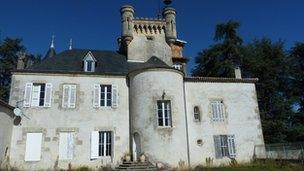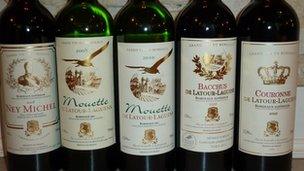Chinese buy their favourite Bordeaux by the vineyard
- Published
High demand for wine has driven the price up 10% over the past year
With its fairytale turrets and a 15th-Century tower, Chateau Latour Laguens is surrounded by vineyards in a region steeped in European tradition.
But this chateau, south-east of Bordeaux, is also at the cutting edge of Asia's growing economic might.
The staff who tend the vineyards and make the wine are still French, but this is now a Chinese-owned domain.
It has been taken over by the Longhai group based in eastern China, which has created a subsidiary to run it called Chateau Latour-Laguens (Qingdao).
The Chinese are developing a new taste for French wines these days.
And in addition to buying them by the bottle or the case, the Chinese have also started buying the vineyards where their favourite Bordeaux vintages are produced.

Chinese investors have bought six estates over the last three years.
Chateau Latour-Laguens was the first estate in Bordeaux to be bought by Chinese investors three years ago, but at least five others are now also Chinese-owned.
"We're looking for the know-how, French technology and culture," said Yilain Xu of Chateau Latour-Laguens (Qingdao).
"Bordeaux is a famous place to make high-quality wine and in China we have more and more people who drink wine, as lifestyles are changing."
The new owners of Chateau Latour-Laguens have invested in the latest wine-making technology, and are renovating the chateau itself, which was somewhat run down before they took over.
But they have been careful to keep the French workers, and have hired an experienced French oenologist, or expert in the science of winemaking, to manage the operation and improve the quality of the wine.
Planting in China
But Chinese companies are not just investing here in Bordeaux, they are also developing winemaking in China, which is now the world's seventh largest producer.
They are even creating chateaux and vineyards that look just like the ones here in France. It is perhaps no accident that Longhai is based in a part of China where the climate is similar to that of Bordeaux.
Much to the astonishment of European experts, a wine made in China recently won a major international award in the Bordeaux category, beating its French rivals in a blind tasting.
That has made some Bordeaux wine growers worried about the future.

As well as owning several Bordeaux vineyards, China is also producing its own award-winning wines.
French wine growers say that one of the determining factors in the distinctive quality of their wine is their soil, "le terroir".
But news of the prize-winning wine from China is starting to shake some of the old certainties.
"It's the small, struggling chateaux that foreigners are buying so we're not too worried for now," said Didier Cousiney, whose family have been wine-growers for generations.
"But we are afraid that it could be a problem in the future if it happens on a large scale, especially if the buyers are from countries like China where they're making high quality wines and could produce enormous quantities."
Huge potential
But Chinese investors are planning to buy more estates in Bordeaux, and are also now looking at the possibility of acquiring bigger, better-known vineyards.
And yet not everyone in Bordeaux is worried.
Estate agent Daniel Carmagnat arranged the sale of Latour Laguens, and said the nascent Chinese market is potentially so big that there is room for everyone.
"The Chinese market is huge and it's growing very fast, so as the Chinese drink more wine, that will be enough for both French and Chinese producers," he said.
"The Chinese recognise the quality of our wine and they prefer Bordeaux," he said.
"Other regions in France also produce very good wines, but for them it's just Bordeaux."
Wine growers in Bordeaux are grateful that prices have shot up thanks to the explosion of Chinese consumption.
Lean years
Mr Cousiney said it happened as many producers were struggling after a series of lean years.
"The French are drinking less wine and there's a lot of competition from the so-called New World wines from Australia, South Africa and the South American countries," he said.
"If it's better now, it's because of emerging markets like China, Brazil and Russia. We hope that will continue but we don't know how long it will last."
It is difficult for wine producers in Bordeaux to increase production because land is limited and there is only one harvest a year.
So the leading winemakers here are investing heavily to improve quality.
They know that the challenge they will face in the future will be making sure that no matter how well their Chinese rivals copy them, fine French wines retain a certain je ne sais quoi.
- Published28 May 2011
- Published9 May 2011